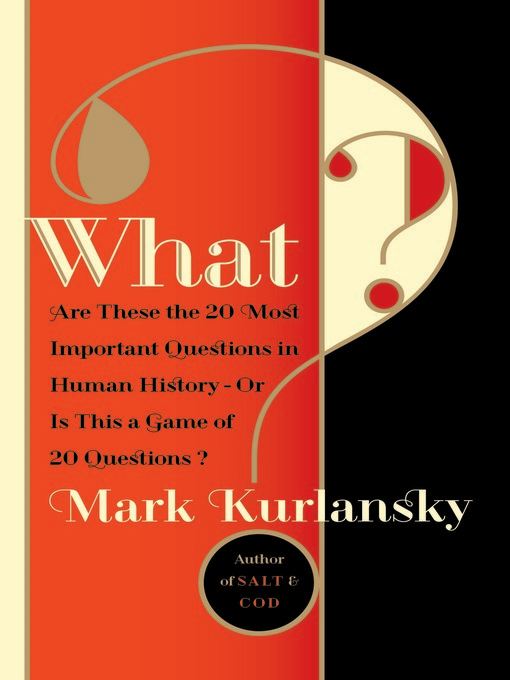
What?
Are These the 20 Most Important Questions in Human History - Or Is This a Game of 20 Questions?
کتاب های مرتبط
- اطلاعات
- نقد و بررسی
- دیدگاه کاربران
نقد و بررسی

January 15, 2011
A conceptual essay collection as parlor game.
Even shorter than this very short book initially appears (with lots of white space and full-page illustrations), the latest from Kurlansky (The Eastern Stars: How Baseball Changed the Dominican Town of San Pedro de Macoris, 2010, etc.) is a radical departure from his usual work, which features exhaustive research into topics of comparatively limited scope (Salt, Cod, etc.). Here the author uses an interrogative shorthand to sketch inexhaustible concepts such as the purpose and meaning of life (and death), the essence of literature and the ontology of asking questions. Nearly every sentence (as well as chapter titles) ends with a question mark. Some are questions; others are declarative sentences reworked into questions. Some blur the line between serious and seriously goofy: "If whoers are gossips, wheners impatient, whyers dreamers, where-ers lost, and howers pragmatists, is it the whaters who cut to the heart of things," he asks in the title chapter. "What am I talking about? What is this book? What is a book?" And so on. Kurlansky also cuts to the heart of metaphysical inquiry: "Why are we here? Why is all of this here? What is death? What does it mean that outer space is infinite and what is after infinity?" Is the book's concept a good one? Does it compromise the author's originality that the recent novel by Padgett Powell, The Interrogative Mood: A Novel? (2009), adopted a similar stylistic strategy? Though the book can easily be read in one short sitting, it might try the patience of some readers.
Two of the chapter titles anticipate two of the likely responses: "So?" and "Huh?"
(COPYRIGHT (2011) KIRKUS REVIEWS/NIELSEN BUSINESS MEDIA, INC. ALL RIGHTS RESERVED.)

April 1, 2011
With only a handful of exceptions, there are no declarative sentences in this little book, but thats not merely a clever literary conceit. Kurlansky, author of such notable books as Cod (1997), Salt (2002), and 1968 (2004), has a good point to make: its by questioning accepted wisdom and looking around the corner that we learn about our world and about ourselves. He asks us to consider some mind-expanding questions. For example, Does Descartes famous existential proof (I think, therefore I am) mean that people who dont ask questions have no proof of their own existence? Have you ever noticed that the one question we often fail to ask is perhaps the most important one (Am I completely wrong?)? Whats more important, getting answers or asking questions? And what does it mean that most of the fundamental questions came out of ancient civilizations? (Are we running out of good questions?) What at first appears to be a slight, merely quirky bookHey, look! This guy phrases every sentence as a question!sneaks up on us and, in the end, leaves us with a new appreciation for the power of the question mark.(Reprinted with permission of Booklist, copyright 2011, American Library Association.)

























دیدگاه کاربران